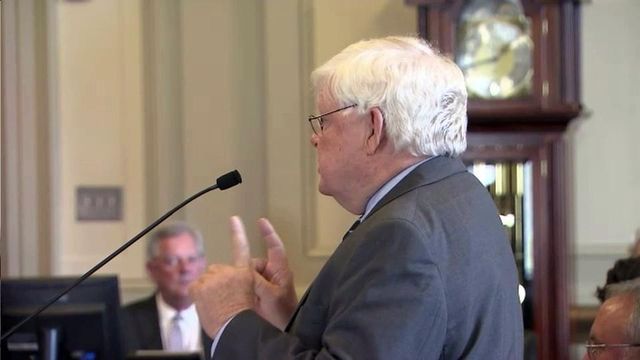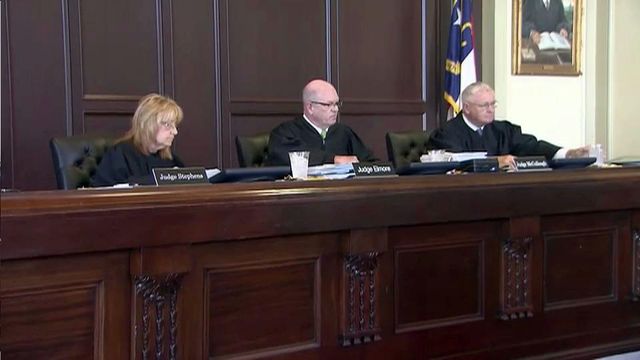NC appeals court weighs Duke Energy merger deal
A North Carolina appeals court on Wednesday began weighing whether the state utilities regulator fully considered consumers before approving the deal that made Charlotte-based Duke Energy Corp. the country's largest electric company.
Posted — UpdatedThe three-judge panel heard arguments in a lawsuit challenging the state Utilities Commission's decision last year to allow Duke Energy to buy Raleigh-based Progress Energy. The advocacy group NC WARN contends the commission allowed Duke to make deals with big power customers while consumer risks were played down.
NC WARN attorney John Runkle said that while it was too late to unravel the deal that closed 16 months ago, the panel should direct the Utilities Commission to re-examine the deal to consider detailed consumer effects. The state Supreme Court ruled earlier this year that the state Utilities Commission did not adequately consider the negative effect on consumers by allowing Duke Energy to raise rates by 7 percent.
"We have hundreds of thousands of families that can't afford electricity now," Runkle said. "The rates have been increasing. They have considerable hard times in paying for their monthly bills. The disconnects are very high."
The combined utility now provides electricity to more than 90 percent of North Carolina residents, either directly or through its wholesale customers, he said.
Although the merger included the promise that Duke Energy would pass along at least $650 million in fuel savings to consumers, NC WARN has pushed that the company contribute another $27 million a year for a decade to help low-income residents. Runkle raised the suggestion again in court.
"You're basically asking us to reverse the commission and impose a $270 million" order, Judge J. Douglas McCullough said. "Can we do that?"
Duke Energy countered that NC WARN ignores that, without the merger, there would be no shared fuel savings at all.
The commission met its duty of deciding whether the deal broadly met the public interest and regulators weren't required to consider the impact on poor residents or any other group, Duke Energy attorney Dwight Allen said.
State law "doesn't say that they have to go through every single expense, every single item," Allen told the court. "What we have to do is show benefits at least equal to and outweighing the costs of the merger. The record in this case is that that has been the case."
Power companies are buying each other up because the generating plants built across the country in the 1950s and '60s need replacing, a huge cost that requires companies big enough and profitable enough to borrow billions at low interest rates, Allen said. State regulators knew that failing to allow Duke and Progress to combine might have led to about 30,000 jobs and much of the taxes the combined company paid to be pulled away by an out-of-state competitor, he said.
"There were a number of companies looking to acquire Duke and Progress," he said.
Judge Linda Stephens noted that NC WARN was challenging that the Utilities Commission didn't factor in the cost of the merger to customers, not the benefits to the state.
Allen said the costs to customers doesn't need to be weighed.
"The commission says in its findings and conclusions – and I think they're right – that the issue of low-income customers and what we should do from a public policy standpoint for low-income customers really is not a major issue. It's really not a relevant issue of the merger," he said.
The city of Orangeburg, S.C., is also challenging terms of the merger that would make it harder for the city to get discounted electricity when its current contract with Duke Energy ends in about a decade, attorney James Horwood said.
The lawsuit challenging the merger is the latest twist in a multi-billion-dollar deal and the boardroom intrigue behind it.
Days after the utilities commission blessed the merger of North Carolina's two Fortune 500 energy companies, Duke Energy closed the deal July 2, 2012. The company shocked investors and consumers by saying the completed merger including the hiring and firing hours later of Progress Energy CEO Bill Johnson, who for a year and a half had been promised the job heading the combined company. The surprise CEO switch prompted shareholder lawsuits, led consumers to suggest the state regulator was duped, pushed board members to resign and drove down Duke Energy's stock price.
The state's utilities commission and attorney general launched separate investigations into whether Duke Energy misled officials before its buyout. Both settled after the company agreed to greater oversight, management changes and another $30 million for ratepayers and low-income assistance.
Allen said the merger was settled a year ago, and the utility needs to move forward.
"This thing has been going on a long time. Uncertainty is a terrible thing for employees, ratepayers, shareholders – for everybody involved in this thing," he said.
Duke Energy serves 7.2 million customers in the Carolinas, Florida, Kentucky, Indiana and Ohio. It is the largest U.S. utility as measured by number of customers and market value. Duke posted third quarter profits of $1 billion on Wednesday, almost 70 percent higher than the same period last year.
• Credits
Copyright 2024 by WRAL.com and the Associated Press. All rights reserved. This material may not be published, broadcast, rewritten or redistributed.






